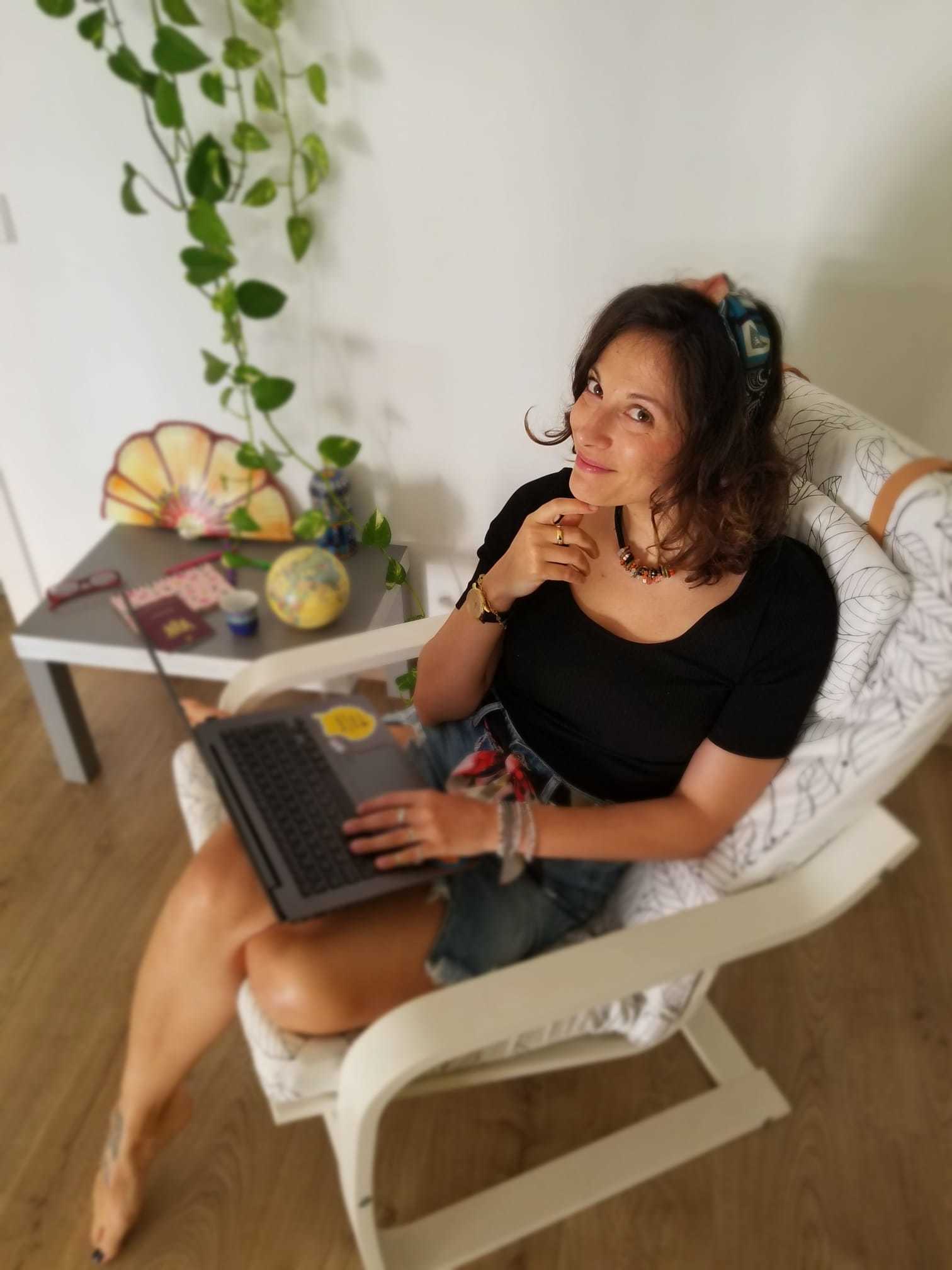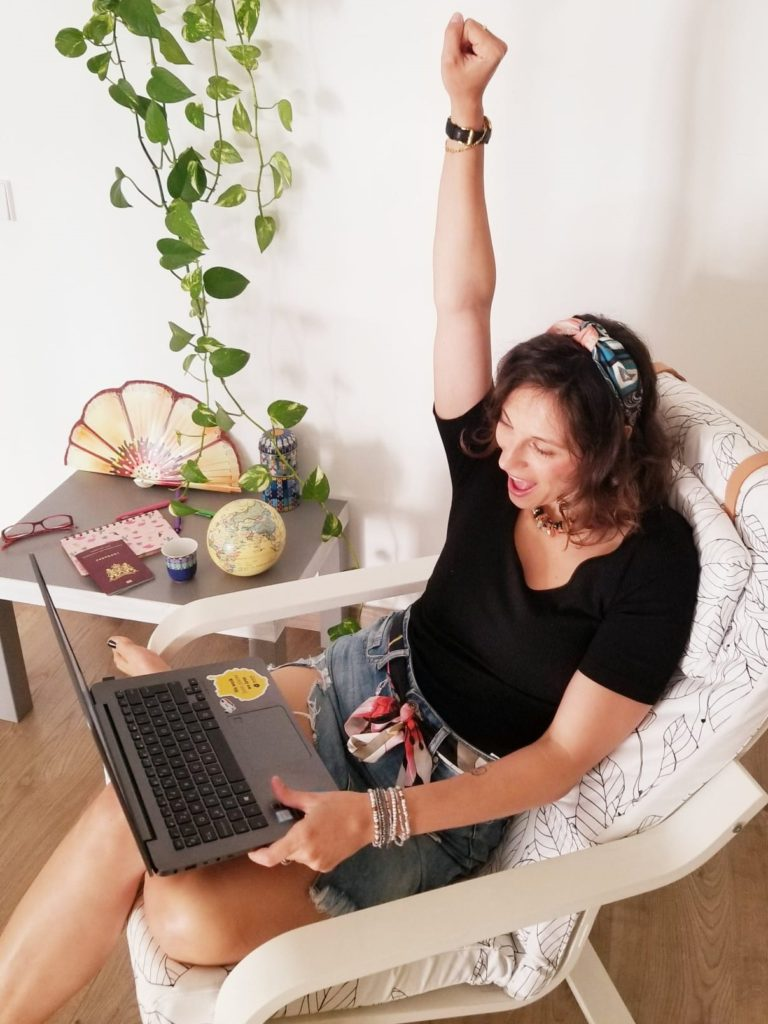Remote Work Advice by Remote Career Coach Fabrizia
Q: Tell me a little bit about yourself and your position as a Remote Career Coach. What does a Remote Career Coach do and what led you to start working remotely?
A: My name is Fabrizia Zanca, I’m 34, Italian, living in Barcelona (Spain) with my Dutch husband and our 4yo daughter... and we have a baby boy coming soon!
In 2018 I decided to leave a well-paid corporate-job because I needed more flexibility for me and my family. I needed a real work-life balance, and the possibility to stay with my daughter whenever she needed me, and visit our home-countries (Italy and Netherlands) whenever we wanted - without having to ask “permission” to stay with our loved one to my employer. I was so tired of the old system that tells you how many days off you are entitled to have, when to use them, what time you must work or not... And joining a fully distributed, remote company seemed the right decision!
So I challenged myself to find a full-time remote job in 30 days, and I actually did in 22! I landed my first remote job as an International Remote Recruiter, working for one of the coolest cryptocurrency and blockchain tech companies from the Silicon Valley. At that time people thought I was crazy to leave a stable job for a contractor one... but then friends and family started to see the numerous advantages that the decision I took gave me, and started to ask me how I did it, where they could also find a remote job, and if I could help them out. That’s where the idea of becoming a Remote Career Coach started. I saw that my recruitment knowledge and my job search approach got my friends good remote jobs as well, and I decided to transform this into a coaching activity!
There are not so many Remote Career Coaches around the world, and even less in Europe, (although I think this is a career that will develop in the close future) and I feel honoured to be one of the first ones in space! What a Remote Career Coach does is giving remote job seekers the knowledge, tools, and confidence to land a Remote Job. We are not a recruitment agency, nor headhunters. In my case, I use my background in Work and Organisational Psychology, my work experience as an International Recruiter, and my knowledge of the Remote Workspace to coach my clients to get hired by trustable remote companies, by:
● Understanding how their current set of skills and experiences match the remote job market
● Leveraging different strategies to find remote jobs
● Teaching how to write customised, remote-ready applications
● Preparing them for video interviews with remote companies

Q: As an experienced Remote Career Coach who’s been in the business for a while, you must love what you’re doing, could you tell me what the favorite part about your job is and why?
A: You are absolutely right - I love what I am doing as a Remote Career Coach! I am a firm believer in the Remote Work Revolution (ways before the pandemic started), because of all the benefits it brings both for employers and employees, and I want to contribute to having Remote Work go mainstream, by focussing on helping remote job seekers achieving their dreams! It makes me extremely happy when my clients get hired remotely, and can finally fulfil their dreams of living in the place they love, spending more time with their loved ones, becoming Digital Nomads, having access to better job opportunities, and even getting access to higher salary ranges! Knowing that I have helped them achieve these dreams, especially when they thought it was impossible, is really what I love the most about my job.
Q: The job market has been slightly competitive with more people applying for jobs due to the pandemic. Therefore, it’s been hard for many people to find a job, especially if you have limited or no work experience.
b: What would your greatest advice be for people having a hard time finding a job nowadays? What should their main focus be to find the right job?
A: Oh yes, competition among candidates to get a remote job has drastically increased since the beginning of 2020, and many studies have shown it. Not only unemployed people are looking for remote jobs, but also those who have been exposed to remote work (and have seen the advantages of this type of work setup) and companies are telling them that this will not be allowed long-term, are now considering to leave their current employer for a fully remote one.
There is three-piece of advice I’d give to remote job seekers:
1. Know what you can offer to the market and how your skills match the remote job opportunities: many people think that only tech experts, or people working in digital marketing, or US candidates, are entitled to work remotely. The truth is that many professionals already have the right skills to be hired as a remote contractor! I’ve helped a Private Chef, a Mechanical Engineer and a Nuclear one to go Remote...there are opportunities for everyone if you know which skills you already possess.
2. Know where to search: another problem my clients always report is that they can’t find the right opportunity for them, based on their location, job field, industry experience...This only means you are looking in the wrong place! There are so many ways to find remote jobs based on the region you live in (your platform is an example!), or based on your career/industry interests, such as choosing the right Job Board, Networking, Social Media, Strategic google search, Online and Offline events... you name it!
3. Customize your application... always! That’s the only way to get invited to a job interview. This means that every time you apply to a new job, you need to design your Resume, Cover Letter, Email script (and even your video presentation) based on the specific job and company you are applying for. Do your research and show them your values, and remember that the focus in not you, is the company and how you are going to solve their problems!
Q: With no previous remote experience, not having English as your native language, and not being a tech-navy professional, you landed a job in 22 days as a Remote Recruiter. Three years later you run your own online consulting business and you can happily call yourself a Work Advocate, Recruiter and a Career Coach, all based from home. What has been your secret to success?
A: Wow, no one asked me this question before! I think that this really comes from my personal attitude to life and development. I’ve always refused to be taught what should I do, who can I be, or when, and I believe that hard work, commitment, patience, and confidence nicely combined together, can bring you wherever you want in life! My life has been a constant “flow”, I tend to take decisions without thinking about it too much, and then see what happens and adjust the actions when “things” develop... Probably this is an approach I’ve used since I was a child, as I’ve never been afraid of the future or new situations. My past experiences have shown me that, in a way or another, I’ve always been successful in all the crazy decisions I took and this gave me the confidence of starting new things without having fear stopping me. I’m not sure if this is the best approach for everyone, but one thing is sure: never allow fear to stop you from being the person you wanna be!

Q: What were the most challenging and surprising things when you first started working remotely? And what should others expect walking down the same road?
A: Moving from a corporate to a startup environment was definitely a challenge for me. I used to work in international organisations with thousands of employees all around the world, and to avoid chaos and allow work to run, these organisations tend to have processes and policies. Startups are more flexible, faster, they rapidly change goals as the market changes.
In the beginning, adapting to such a different style has been challenging. I sometimes felt frustrated about putting so many hours of work into a project, and then see that it was no longer the top priority. The most surprising thing was the freedom I experienced. I knew that joining a remote company would have given me a lot of flexibility, but it was astonishing to see the level of trust and freedom the employer gave me, not only in terms of time management during the day, but also from a work perspective. Any idea, any initiative, if well thought and presented, was so very well welcomed! I was not “stuck” in my role and department, and I really loved the idea of being able to shape my own career development!
Q: Having a balanced lifestyle between work and home can be tough when you’re working remotely. How do you manage this on your own and what advice would you have for others who are trying to find balance in their life working from home?
A: It’s funny how we work to work remotely to have real work-life balance, and how hard it can be to actually achieve it, because of our own ability to un-plug sometimes. I must say that it is even harder when you have your own business, so I’m still trying to figure this out!
But as a Remote Worker, something that really helped me was:
1. Having a private phone and a work phone, same for the laptop: I’d just turn off all my work-devices when my working day was over, and that really helped to unplug.
2. Having a side passion/family: having a family with a daughter who had to be picked up at a certain time certainly helped me to set boundaries. But also having side passions, sports, interested, and plan time for that throughout the day/week is important to not having work taking all your time!
3. Plan your schedule on Sunday: if you don’t plan time for non-working activities, work will take over and you’ll end up working 50 hours per week. So schedule your time, and stick to it no matter what happens!

Q: Working in an office offers some distinct advantages as a workstation that allows you to carry out tasks, an organisational culture that makes your working day more rewarding, a clear distinction between home and work and maybe perhaps the most important, human contact. How do these benefits weigh up against the positives of working from home?
A: Indeed, there are some elements of working from an office that remote work will have difficulties replacing, and that’s why I always say that remote work is not for everyone, and people should be very aware of some challenges that it can bring, and how to manage them. So my answer to that question is to actually take a moment to analyse advantages and disadvantages based on your own, personal needs, situation, and personality. If you are a very extroverted person who loves constant human contact and doesn’t get bothered by constant interactions or noises in an office, and you even enjoy commuting to go to the office, and hates to be alone, then remote work is probably not for you. Unless you leverage some tools that will still help you meet people, such as joining a co-working space. Write down your priorities, what is negotiable and what is mandatory for you, and you’ll understand if remote work is a good idea for you or not.
Q: Though the pandemic has disrupted the workplace, the bright side is that it has increased the access to more remote jobs across many career fields and has helped both employees and companies stay afloat. Now with lockdown starting to ease, many companies are starting to rethink their working models and are doing arrangements to promote more remote work.
b: What do you believe the future holds for remote work and what do you wish to see in the future industry?
A: Back in November 2019 I joined a conference called Nomad City, where all of us speakers kept saying “Remote Work is here to stay”, and some insisted on saying that “2020 is the year of remote work”. Looking back, it sounds like a prophecy!
The pandemic has shown to the world that, for many industries and roles, Remote Work actually works. Employees don’t need constant supervision, or their presence in the office, to be able to successfully perform in their roles... quite the opposite I’d say! Remote Work has SO many benefits for an employer: increased productivity of their workers, increased retention, reduced costs, access to a larger pool of talents... just to name some! If a company wants to stay competitive, they’ll have to allow a certain degree of flexibility, more than what they used to give before the pandemic otherwise, their most valuable resource (the human talent) will leave them, or not apply to their vacancies. That’s why remote work is here to stay. But companies and their leadership teams should get the support of remote work consultants to be able to shift to the right remote work set-up for them. Just as an individual, every company is different and there is not a unique remote-work set-up that can be valid for every company. And that’s where a Remote Work Organisational expert can help an organisation to implement the right model to manage a distributed team.
Q: Is there anything else you would like to lift in this interview?
A: In my experience, I've seen many qualified professionals starting courses to become marketers, developers, designers, because they thought that this is the only way to be able to land a remote job. I just want to tell these people that this is not the reality! Most of you already have the skills to work remotely: all you need to do is understanding HOW your current set of skills can match the remote job market, and if there are some competencies you need to up-level. Once that's clear, find other experts that are doing what you want to do, connect with them, network, build your own remote job search strategy, create your authority and become an expert in that field, and create outstanding applications for the jobs/companies you find and you love! With strategy and patience, you'll achieve your dream of working remotely! I've built a community for remote job seekers where I discussed all (and more) the above topics, feel free to check it out and join if you think it will help you (I know it will). https://go-remote-vip-circle.mn.co/landing
Find remote working opportunities today by visiting Remote Worker











